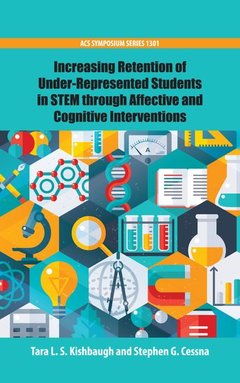Description
Increasing Retention of Under-Represented Students in STEM through Affective and Cognitive Interventions
ACS Symposium Series
Coordinators: Kishbaugh Tara L. S., Cessna Stephen G.
Language: English
Subject for Increasing Retention of Under-Represented Students in...:
Publication date: 10-2019
176 p. · 15.8x23.6 cm · Hardback
176 p. · 15.8x23.6 cm · Hardback
Description
/li>Biography
/li>
The first section of the book describes some of the underlying theories for understanding how and why students are or are not retained in science. As this field is quite broad, this section does not provide a comprehensive overview of all possible theories used to understand this problem, but instead it seeks to provide a rationale for the use of a specific theory to ground the nature of the interventions used to address poor retention of STEM majors. In addition, this section addresses some of the nuances that are important to consider when applying a theoretical framework at your institution. In the second section, these theories are elucidated by case studies from diverse institutions, which have implemented strategies to address the problem of poor retention at their schools. In addition to diversity of institutions, the projects themselves are at different stages. Some, such as Swartz and Gregg-Jolly's chapter, describe a project that is very well established. While others, such as Kishbaugh's project, are in early stages. Some of these interventions are aimed at generating and testing better pedagogical tools and supports for a wider audience of students, such as Greco's description of the studio model for general chemistry and Hollinsed's approach to testing in general chemistry. Others use peer tutors, peer mentors, and/or diversity-responsive teaching materials. Others describe mentoring, intrusive advising, or cohort models. All S-STEM projects involve cohort building; examples can be found in Kerrigan's chapter or Blecking's chapter. Perkins's project also describes the importance of addressing stereotypes in science. These case studies demonstrate a balance of attention towards affective dimensions, such as self-efficacy and identity, with evidence-based teaching methods.
Tara L. S. Kishbaugh (Ph.D., Dartmouth College) is currently a Professor of Organic Chemistry at Eastern Mennonite University in Harrisonburg, Virginia, where she teaches courses in organic, general, medicinal, and environmental chemistry as well as seminars on ethics, land use, and food chemistry. Since 2013, she has chaired the biology and chemistry departments. She was a Dreyfus teaching postdoctoral fellow at the University of Massachusetts, North Dartmouth campus. Dr. Kishbaugh has published 29 papers, given over 30 presentations, and is PI on an NSF S-STEM grant: STEM Scholars Engaging in Local Problems. This was the first ACS symposium that she co-organized. Stephen G. Cessna (Ph.D., Purdue University, W. Lafayette, IN) is a Professor of Biochemistry and the Daniel B. Suter Endowed Chair at Eastern Mennonite University in Harrisonburg, Virginia, where he teaches courses in introductory chemistry, biochemistry, plant physiology, and sustainable agriculture. He was a USDA visiting research fellow in the department of Ecology and Evolutionary Biology, University of Colorado, 2008-09. He has published 17 papers, given more than 30 presentations, and serves on editorial boards for Natural Sciences Education and the Journal of Research in Science, Mathematics and Technology Education.
© 2024 LAVOISIER S.A.S.




